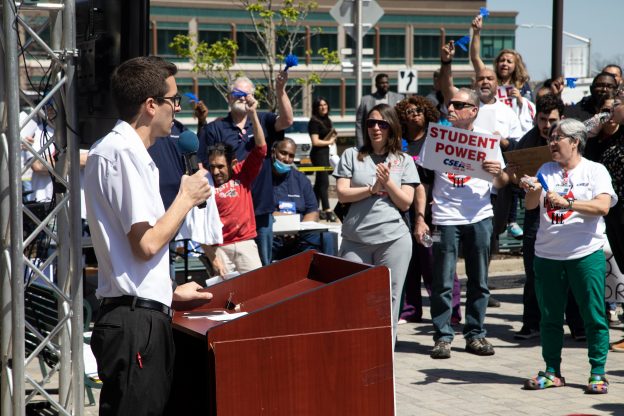
After proposing a controversial new parking plan in early February, Stony Brook University’s Mobility and Parking Services (MAPS) announced in an email sent to the campus community on May 17 that no changes would be made to the current parking structure for the fall 2023 semester.
This contradicts MAPS’s previous plan to implement the new model for the fall 2023 semester. The new parking model would have charged anyone who parks on campus a monthly fee to do so, with parking lots closer to the center of the University costing more per month than lots located farther away.
Other changes announced by the email included the elimination of the waitlist system to purchase commuter premium parking permits, as well as information regarding a new pilot program in Lot 5 that would decrease the daily cost to park there.
The paid parking proposal was met with severe pushback from members of the campus community, including the Undergraduate Student Government (USG) and different unions present on campus. At one point, local politicians even reached out to Stony Brook President Maurie McInnis advising the University not to use the planned parking structure.
According to the email sent out by MAPS, discussions with different campus stakeholders had significantly delayed the implementation process.
“As we continue discussions with stakeholders, we understand that students would like to plan for the upcoming academic year. In order to allow time for continued discussions, there will be no changes to the current student parking structure for Fall 2023,” the email reads.
University officials commented on the decision in an email to The Statesman.
“The email that was sent to all students on Wednesday, May 17 contained pertinent information for summer 2023 transit operations, parking, and fall semester expectations. The remainder of the parking proposal is still being discussed with the various campus unions and updates will follow when they are available,” the email read.
However, Andrew Solar-Greco, the president of the United University Professions (UUP) Stony Brook West Campus Chapter, a union representing employees across the State University of New York (SUNY) system, said in an interview that discussions regarding parking had not yet commenced.
“They literally haven’t started,” he said of the negotiations. “[We have not yet] set the ground rules, which is [deciding on] how many people are in a room? How often are we meeting? We haven’t even agreed on that yet.”
“Everyone was blindsided,” Solar-Greco said of the email sent out by MAPS on May 17.
According to the collective bargaining agreement signed by both UUP and New York State, all changes to parking costs must be negotiated with unions and cannot be changed without an agreement between SUNY and UUP. When MAPS unveiled the paid parking plan in early February, they did so without notifying campus stakeholders beforehand.
According to Solar-Greco, this created a situation where unions felt that this new proposal and the increased costs caught them off-guard and that the proposal was presented without an opportunity for negotiation. He had also pointed out in an interview for a previous article that West Campus was already seeing recruitment and retention issues and that the increased cost of parking was likely to amplify these problems.
In a podcast produced by The Statesman, Doğa Öner, chief steward of the Stony Brook chapter of the Graduate Student Employees Union (GSEU), cited concerns about the cost of living compared to university stipends given to graduate students — something that would only be amplified by increasing parking costs.
“We are already living below the poverty level,” Öner said. “In Stony Brook, you need to kind of have to have a car to get by, and many graduate students do. So, [these changes] will affect many graduate students deeply.”
Öner also confirmed in the podcast that ground rules for the negotiations had not yet been decided upon.
In an analysis conducted by the UUP Stony Brook West Campus Chapter, it was found that close to 85% of SUNY campuses charge less than $50 per year for parking, and over 50% of SUNY campuses do not charge anything. The cheapest price Stony Brook is proposing is $10 per month — upwards of $100 a year.
However, this tier only allows drivers to park in the South P lot, a parking lot considered remote to the rest of the university that requires an additional bus ride to reach the main areas of campus. The most expensive tier is currently proposed to cost upwards of $600 every year.
The UUP analysis also found that approximately 73% of colleges on Long Island, N.Y. do not charge for parking, and of those that do, only 50% charge more than $50 per year.
University officials did not directly respond to a question about plans to implement the paid parking model past the fall 2023 semester.
In an email, Devin Lobosco, president of USG, affirmed the organization’s opposition to an increase in parking costs.
“USG was certainly relieved to hear that any parking changes had been postponed for the fall,” Lobosco wrote. “We felt that the initial plan was rushed and did not give us enough time to understand the situation and its potential consequences. Regardless, MAPS has made it clear that paid parking is needed at Stony Brook, so this is certainly far from the end of the issue. My colleagues at USG and I are going to be working diligently over the summer and fall to understand how the situation evolves and fight for an equitable outcome for the student body.”
Solar-Greco also emphasized how UUP is committed to making sure that non-union members of the campus, such as students, will have knowledge of the bargaining process and developments that come with it.
“We’ve been fighting for open bargaining: the ability for students, non-union members, our union members, but especially the broader public that does not have a seat at the table to make sure that they can see what’s happening behind the scenes, and be part of it,” he said.
He also pointed out the friction that the plan would cause between Stony Brook University and the surrounding communities.
“It has to work for the surrounding community,” Solar-Greco said. “If they want $50 a month, people are going to start parking in the surrounding neighborhoods, and these surrounding neighborhoods already have, in some ways, a rocky relationship with the campus because of [Stony Brook’s] practices, and they are going to be really upset.”











